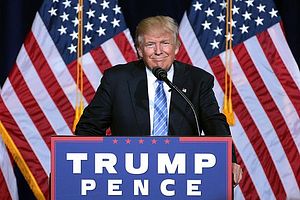Since Donald Trump’s stunning election victory on November 8, much has been written about the possible implications for U.S. foreign policy and how it could affect the world. In addition to debates in Europe, speculation has been particularly heated in Asia, as the president-elect’s ambiguity about whether the United States will maintain its security commitments to Japan and South Korea has potentially profound implications for both regional and global order.
Yet since key appointments still have to be made, it is too early to make region-specific predictions. Indeed, given how little Trump knows about foreign policy, and how much he may have to depend on insiders, it is possible that we will see much more continuity than change.
One remarkable development, however, is already becoming apparent: a bruising election campaign and the victory of Donald Trump is likely to lead to an unprecedented decline in U.S. soft power.
In addition to weakening the social fabric of U.S. society and verbally attacking any non-white minorities, boasting about sexual assault against women, mocking disabled people, and supporting torture, Trump’s decision to criticize the judiciary, threaten to prosecute journalists, and allude to voter fraud significantly undermined democratic culture in the United States and its attractiveness in the world. The nomination of a white supremacist as chief strategist at the White House and Twitter attacks against the New York Times suggest that Trump’s rhetoric is unlikely to change much after the election.
The rise of “post-truth” and identity politics will weaken the West’s key advantage vis-à-vis a rising China: its noisy but ultimately moderate and stability-producing democracy, its embrace of diversity and globalization, and its capacity to integrate migrants from all over the world. These are some of the key ingredients of U.S. soft power abroad.
Irrespective of actual policy changes, President Trump symbolizes the end of an era in which the United States projected itself as a model democracy and built most of its foreign policy rhetoric around the notion that other countries should look toward it not only for protection and economic cooperation, but, perhaps even more importantly, for inspiration and guidance.
U.S. soft power always functioned as a key pillar of that strategy and consistently sought to claim the moral high ground, even in moments when ill-conceived military adventures temporarily led to anti-U.S. sentiment around the world. The United States served as the bastion of the liberal internationalist camp and tried to weaken (at least in rhetoric) voices of populism, nationalism, and xenophobia – whether in Russia, Venezuela, China, or, most recently, in the United Kingdom before Brexit. President-elect Trump, by comparison, chose to receive Brexit advocate Nigel Farage as the first foreign politician after his upset victory.
In Asia, a President Trump may inadvertently help strengthen a notion often repeated in China and across Central Asia that democracies produce more unpredictability than authoritarian regimes. The longer such a scenario prevails, the more difficult it will be to convince other countries that defending democratic governance around the world is both morally and strategically advantageous. In the same way, the stronger anti-Muslim currents become in Western democracies, the harder it will be to claim the moral high ground and criticize governments in China, Myanmar, and elsewhere for the way they treat their religious minorities.
Naturally, soft power is about more than just governments, and U.S. culture per se will remain more attractive to most young Asians. In the Philippines, South Korea, and Vietnam, majorities are still likely to view the United States more favorably than China. And yet, deportations of illegal immigrants and a closing of borders will undermine the way the world views the United States. At the same time, China, eager to enhance its influence in the region through a series of initiatives such as OBOR, the AIIB and CICA (which can also be seen as attempts to promote soft power), will seek to project itself as the defender-in-chief of globalization at a time when the United States has become afraid, pessimistic and inward-looking – hence Trump’s decision to pull out of the TPP.
To policymakers in Japan, Seoul, and Hanoi, U.S. security guarantees will still be essential, as their worries about China’s rise remain unchanged. Indeed, U.S. foreign policy vis-à-vis Asia could be marked more by continuity than change. And yet, as the United States has succumbed, for now, to a nationalist demagogue who cares little about U.S. soft power, it will be worth monitoring public perceptions across Asia of the United States – which may invariably influence the way policymakers relate to Washington in the coming years.
Oliver Stuenkel is an assistant professor of International Relations at the Getúlio Vargas Foundation (FGV) in São Paulo.

































